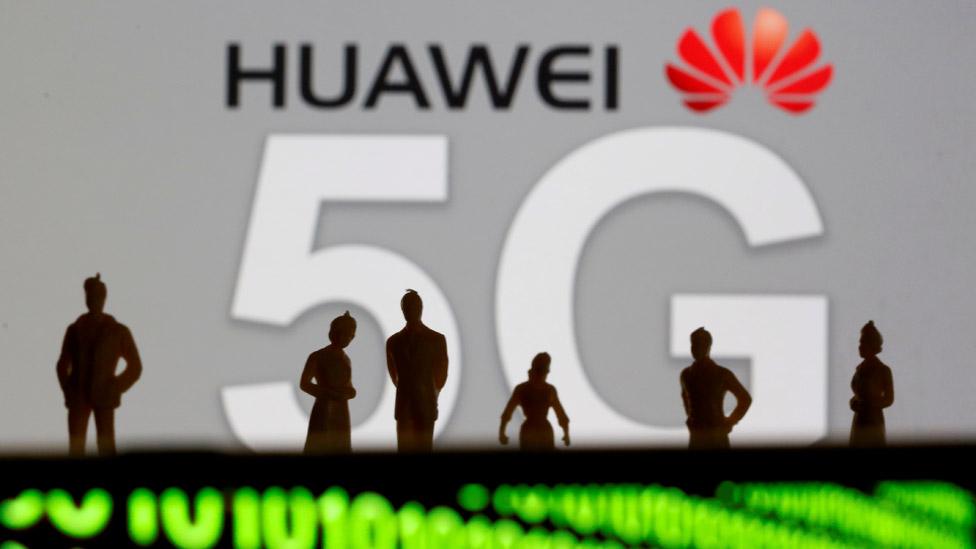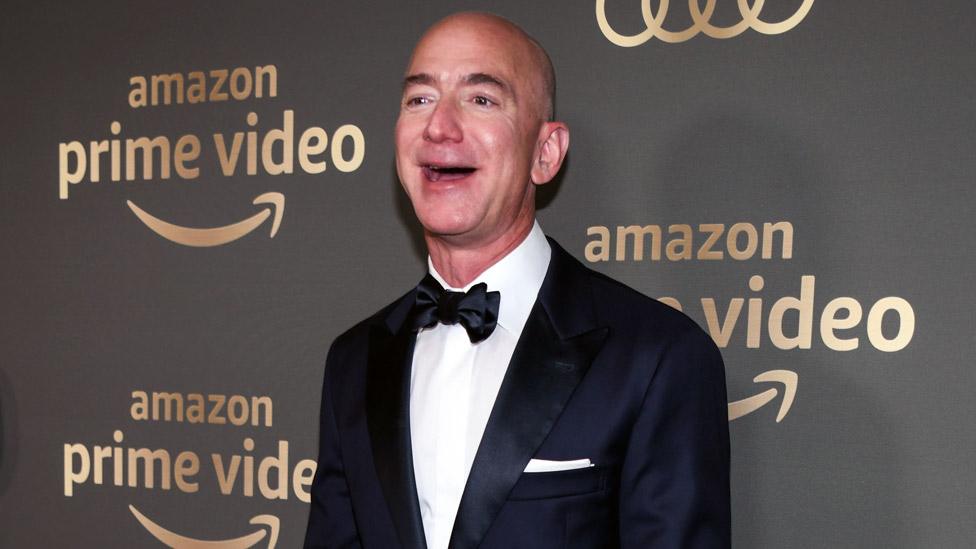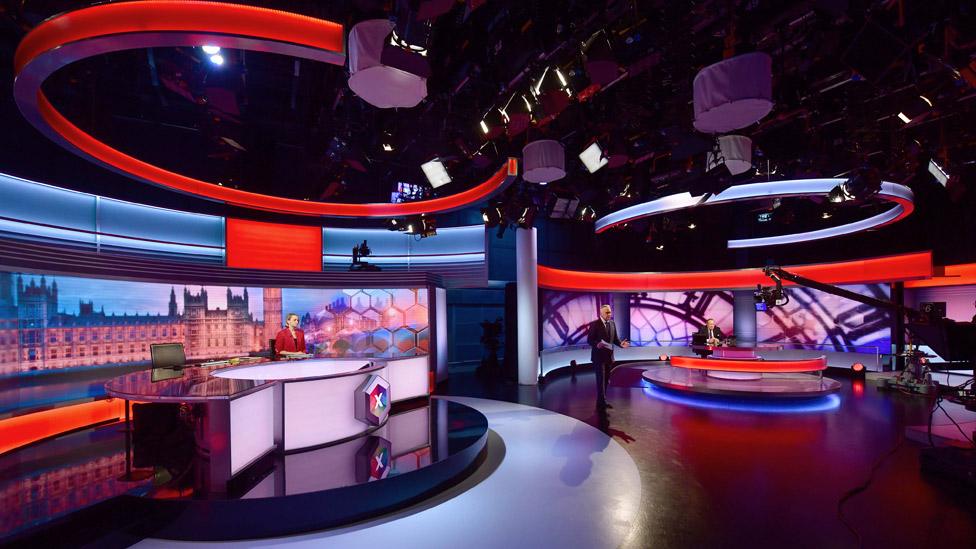Amol Rajan: My 9 media predictions for 2020
- Published

Well, my predictions from last year inevitably adhered to the forecasters' tendency to be better on generalities than specifics.
Facebook didn't make a big move into live sports; no foreign investor swooped on Fleet Street. That said, the Cairncross Review didn't save a single newspaper, and Ofnet was indeed mooted.
I am familiar with the argument that reporters shouldn't pretend they know the future, external. That is obvious. But the exercise of predictions has value because it embodies analysis of current trends, prompts reflection, can inform strategy, and is fun.
So with all due humility, here we go for 2020.
1. Trends vs Events: a rebalancing
For many years I have tried and failed to shift the balance of news from sudden events to gradual, global trends. The advent of social media has wrenched news further in the direction of events.
But in 2020, I reckon the fightback will accelerate. If journalism is about conveying the world accurately, then global trends deserve much, much more attention. They are harder to find pictures for, and often less dramatic (hence the phrase, "if it bleeds, it leads"). Yet they have the immense virtue of truth.
The data shows we really are living through the most extraordinarily peaceful, prosperous, wealthy, healthy, safe period in human history. There is strong evidence to suggest life is getting better in many other ways too. But the news industry struggles to convey this, preferring bad news to good news and creating - especially with social media - a sense of being besieged by crises and disasters.
A rebalancing toward global trends would not only be a truer, more accurate reporting of the of world as it really is; it would also make news a more positive environment.
Editors will always favour recency. The clue is in the name: they want to put the new in news. But sometimes the new, while dramatic, isn't as significant - or accurate - as the gradual.
The sheer strength of the story about deep global trends and the improving state of the world has entered popular consciousness. See Fraser Nelson's excellent recent BBC Radio 4 documentary, which featured Steven Pinker, whose thought and recent work, external was on the agenda when I interviewed him on stage last year, external.
These thinkers' work, and that of organisations like Our World in Data and Gapfinder will, I hope, begin to change the story in 2020, rebalancing toward trends while events inevitably still dominate.
2. Half a world on Huawei

The next great technological revolution will probably be something that's been talked of for years: the Internet of Things. This basically just means loads of connected devices, all in effect talking to each other. So your mobile telling your car you didn't sleep much last night, and prompting it to ask if you're too tired to drive. And so on.
That requires machinery with sensory devices - and super-fast connectivity. The latter will come from 5G, itself a revolutionary technology, which provides very much faster browsing speeds.
But here's the thing: the cheapest (and probably best) 5G technology is made by Huawei, which, like all mega technology companies in China, is not wholly independent of government. So some people think using Huawei is like letting Xi Jinping and his mates into your bedroom. Ericsson, Samsung and Nokia are all sophisticated 5G builders - but behind Huawei.
I've written before about the splinternet, the splitting of the internet into various domains or kingdoms. As we enter an era in which the Sinosphere and Anglosphere quarrel, Huawei will be deployed as a technological arm of the former, operating super-fast browsing that powers economic growth in countries that fall within China's orbit.
3. Eco-browsing takes off
Do you know how much energy is used by the data centres that power the internet? By the end of this decade, it could be 10% of global electricity usage, and cause five times the CO2 emissions of air travel. The more electricity they use, as more people come online and spend more time browsing, the more energy is required to cool them.
In the coming year, I expect you'll hear more and more about the case for limiting your web browsing. Not because it will save your addicted brain and addled eyes - but because it will supposedly save the planet.
4. Amazon's break-up will be mooted

Could Jeff Bezos's Amazon empire start to crumble?
The phrase Big Tech, which I and others have bandied about a lot in recent years, is becoming less useful as the Chinese giants rise and the Californian ones move into different sectors.
Depending on who becomes US president, talk of breaking up Amazon could grow fast (especially if it's Elizabeth Warren). A superb recent series in The New York Times, external detailed just how extraordinary is the company's ambition, reach - and effect on smaller players.
You can imagine countless fronts on which Amazon faces a backlash, from the impact on struggling high streets to the conditions of workers in their warehouses and the environmental impact of their riders driving small packages vast distances - all in the name of our convenience.
As the richest man in the world, Jeff Bezos is an obvious target. Of course, it is very hard to know how you would break his company up; forcing them to sell Amazon Web Services, for instance, isn't wholly practical.
5. Streamageddon
Obviously it is marvellous for consumers that a few (sadly all American) companies are spending stupendous amounts on the best quality television and film ever made. But I'm here to tell you that it can't last.
Netflix is likely spending $15bn (£11.5bn) on content this year; others such as Disney and HBO will spend over $10bn (£7.6bn); and that relative entertainment also-ran called Apple will probably spend something like $6bn (£4.6bn). They're doing this to get you to sign up for their services.
Yet at some point, you will either have signed up already or decided you don't want to sign up to any more (so-called subscription fatigue). And then the prices of these services will rise as shareholders demand profits as much as breakneck revenue growth, and you might decide to cancel your subscription.
When a market is overcrowded, you get consolidation. It sounds like a Black Swan event, and regulators may consider it anti-competitive, but just as the once unthinkable happened when Rupert Murdoch sold the majority of his company, so some of these streaming giants may eventually merge. If not this year, in the future.
6. A shortage of friends for the BBC

What 2020 holds for the BBC deserves a blog in itself. In short, all the pressures faced by the corporation will accentuate, while most traditional sources of support continue to shrink.
Legislation to make non-payment of the licence fee a civil rather than criminal offence is likely to be introduced, and will cost the BBC a couple of hundred million pounds over time. People under 35 will spend ever less time on BBC services, and more on YouTube in particular.
Changes to those eligible for free TV licences will prompt a noisy backlash. And all the while the BBC will find it has fewer friends in Westminster than for a long while. Talk of abolishing the "telly tax", as critics call the licence fee, will regularly go viral.
7. ITV will be bought
Every set of predictions needs a wild card. This is mine. I have no intelligence on current approaches, and actually ITV's decent share price performance under chief executive Carolyn McCall means it might be less likely to go this year than in previous years.
For ITV to be sold, a huge number of circumstances have to align. A deep-pocketed media investor, a willing board, a favourable exchange rate, an exceptionally strong business case based on marrying content and distribution: they all need to be in place.
Yet while building a digital business, and moving into the IP game through their studio arm, ITV remains above all an ad-funded linear broadcaster. It has a lot of great brands that another content provider might want to fold into their international, direct-to-consumer offer. Might this be the year to swoop?
8. Slaves to the Algorithm
I'm afraid this has to be in every year, because it's one of the biggest stories of our time. The willingness of humanity to forfeit decision-making to algorithms will, sadly, grow exponentially in 2020.
9. No foreign investor will swoop on Fleet Street
Having consistently, outlandishly and wrongly predicted in recent years that a foreign investor would come in for a British news brand, I'm now obviously going to predict it won't happen. (Which means it probably will - geddit?)
The obvious candidate is The Daily Telegraph. But there was always something very fishy about the story last year that the Barclay brothers had put it up for sale as part of a review of their business. Not that the story was wrong, just peculiar.
It seemed exactly the wrong the time to put it for sale, when profits had tumbled year after year - but were forecast to rise as digital subscriptions took off under CEO Nick Hugh.
Moreover, if the Barclays needed quick cash, selling the Ritz would make more sense. Putting the story of The Telegraph's availability out there seemed a way of sending a message to the bondholders of Shop Direct - also part of the Barclays' empire - or airing tensions within the family.
As night follows day, it was obvious that former media owner David Montgomery would tell interested journalists that he was keen on buying the title. If a foreign investor did come in, Axel Springer or Belgian group Mediahuis are more likely.
DMGT, the owners of the Daily Mail, have just bought the i newspaper and want to spend the coming months plugging it into their commercial and back-office operations. They can see a lot of efficiency savings in buying a title like The Telegraph, but independent competition regulators might not like it.
And anyway, Paul Zwillenberg, the DMGT CEO, is much more turned on by growing their digital businesses than buying newspapers.
My most confident prediction for 2020 is that at some point this year, a senior figure from DMGT and a consigliere of the Barclays will have lunch - probably at the Mayfair club 5 Hertford Street - to muse on what a friendly Conservative government led by a former Telegraph columnist would make of such a merger.
Best wishes for 2020 - and beyond - to all readers of this blog.
If you're interested in issues such as these, you can follow me on Twitter, external or Facebook, external; and subscribe to The Media Show podcast from Radio 4.
